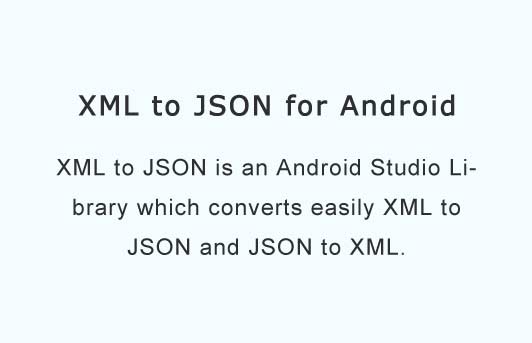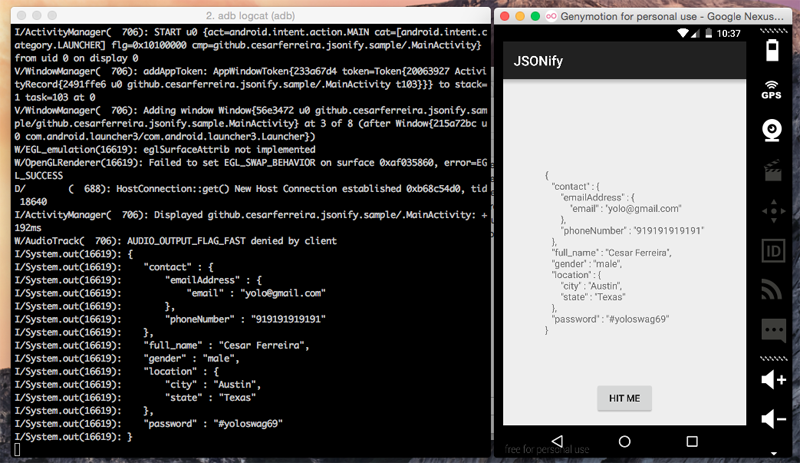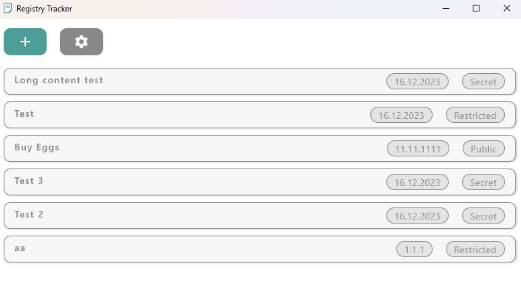XML to JSON for Android
XML to JSON is an Android Studio Library which converts easily XML to JSON and JSON to XML.
It is fully configurable so that you can change for example attribute names.
It is easy to integrate with gradle.
XML to JSON
Basic usage
There are 2 ways to create a XmlToJson object: from a String or from an InputStream.
OR
Then you can convert it to a JSONObject, a String, or a Formatted String (with indentation and line breaks).
Thats' it. Here is an example of XML...
... converted into JSON
Custom Content names
By default, the content of a XML Tag is converted into a key called "content". This name can be changed with a custom one, using Builder.setContentName(String contentPath, String replacementName). You can change as many content names as you want.
Custom Attributes names
Attributes are converted into key / values in the JSON. The attribute names may conflict with other keys. You can change the name of any attribute, by specifying the path to the attribute and the replacement name, using Builder.setAttributeName(String attributePath, String replacementName).
Force a Tag to be a list
In a XML hierarchy, an entry can have children. For example, <library> has 2 entries <book>. In case there is only one book, there is no way to know that Book is a list. But you can force it using Builder.forceList(String path).
By default, the <book> tag is NOT considered as a list
Now <book> is considered as a list:
Force a Tag or Attribute to be an Integer / Long / Double / Boolean
By default the XML attributes or content are processed as Strings. If you want to force them to be another type (like Integer), then use on of these methods Builder.forceIntegerForPath(String path), Builder.forceLongForPath(String path), Builder.forceDoubleForPath(String path) or Builder.forceBooleanForPath(String path).
Here "007" and "000" are converted to 7 and 0.
Note that you can use forcexxxForPath methods AND change the attribute or content name for the same path; the methods in the Builder can be combined. The path used in forcexxxForPath methods is the path in the xml before eventually changing its name.
Skip a Tag or an Attribute
If you are not interrested in getting all the content of the XML, you can skip some Tags or some Attributes. Like for other methods you have to provide the path for the element to skip. You can use skipTag and skipAttribute as many times as you need.
JSON to XML
Basic usage
There are several ways to create a JsonToXml object: from a Json String, a JSONObject or from an InputStream.
OR
OR
Then you can convert it to a XML String or a XML Formatted String (with indentation and line breaks)
Here is a JSON example
which is converted into XML
Force a TAG to be an parent Attribute
You may want to use XML Attributes instead of TAG content. You can do this by using the forceAttribute method. You need to specify the Path to the TAG.
The result becomes
Force a TAG to be a parent Content
When a Tag has only one child, you may want that child to be the Content for its parent. You can use the forceContent method to achieve this.
The result becomes
which is very compact :)
Installation with gradle
Add the following maven{} line to your PROJECT build.gradle file
allprojects {
repositories {
jcenter()
maven { url "https://jitpack.io" } // add this line
}
}
Add the libary dependency to your APP build.gradle file
dependencies {
compile 'com.github.smart-fun:XmlToJson:1.4.4' // add this line
}




